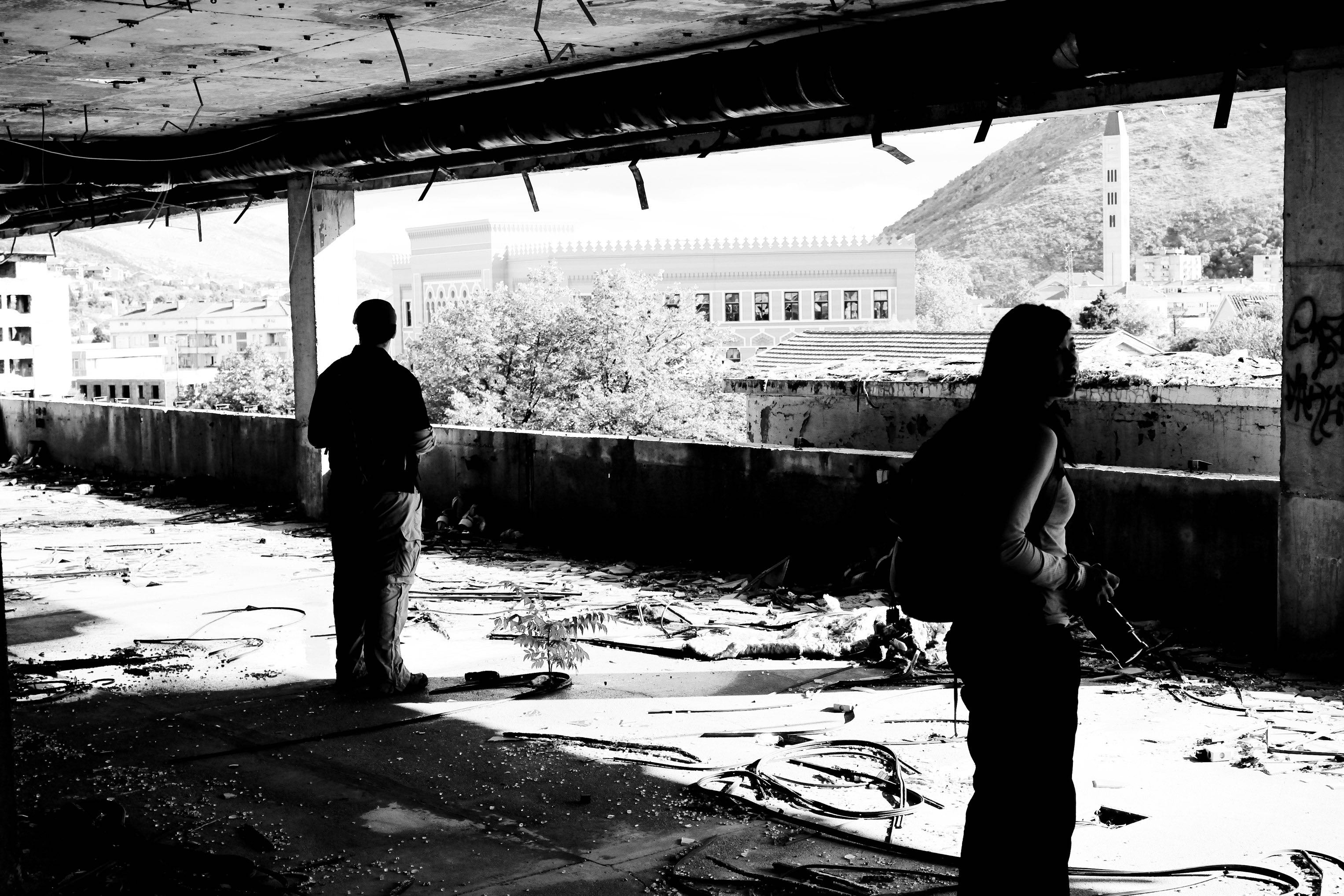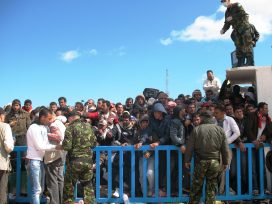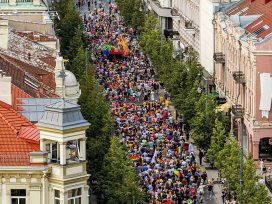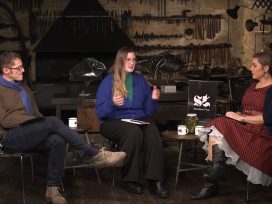Ángel Villarino (interviewer for El Confidencial): In 1984, Yugoslavia seemed to be one of the best countries to live in Eastern Europe. Living standards were similar or even better than in Spain. Sarajevo hosted the Winter Olympics and, at least from the outside, it looked like the country was doing relatively well. Serbs, Croats, Slovenes lived together and ‘ethnic tension’ was something that only happened in soccer stadiums. Nobody predicted then what was to happen just a few years later. The combination of economic crisis and nationalism has a destructive power that can take effect very fast. How was this made possible? Did anyone see it coming in Yugoslavia?
Slavenka Drakulić: Nobody saw it, nobody believed it possible.
But the truth is that it did not happen very fast. Conflicts and wars do not, as a rule, happen overnight, even if it looks like that from the outside. It is enough, for example, to see how it happened in Germany, for example by reading Viktor Klemperer’s book I Will Bear Witness: A Diary of the Nazi Years, 1933-1941. There he describes a series of small steps in the discrimination against Jews, in turning them into Others. It took years and years, and it began by forbidding them to use public transport, buy flowers or visit a barber, then forcing them to wear a yellow star, then… the Holocaust.
In ex-Yugoslavia it took at least five years to whip up nationalist propaganda, homogenize people into national groups and prepare for violent conflict. It actually started with Slobodan Milošević climbing to power in Serbia and with apartheid in Kosovo in the eighties. In that sense, one could say that the rise of Croatian nationalism was a response to its Serbian counterpart, especially after the Serbian minority in Croatia proclaimed its autonomy. After that, Milošević, with the Yugoslav People’s Army, felt he could attack Croatia.
How was it at the very beginning? How did the situation start to become critical?
The media were crucial in this process of creating the enemy. My colleagues – journalists and writers, intellectuals and academics – were willing participants in the nationalist propaganda; they were either true believers or opportunists. You have to know that, learning from history, you must first identify the enemy. This is what nationalist propaganda is all about. It is easier if there is an historical enemy, if there were earlier conflicts that you can built on – like WWII in the case of Serbs and Croats. With the help of elements of history (‘ancient enemies’) plus myths and half-truths, you can create an explosive emotional mixture. Ideology, it seems, can overcome economic interest and reason. We all underestimate the power of emotions. At the bottom of these emotions is fear, fear that ‘the enemy’ would, in this case, take your territory. If the nationalist propaganda manages to create fear in people, then the main step towards the conflict is taken, the main obstacle overcome.
After the first bloodshed, the conflict becomes real. The smell of blood is the trigger for the real confrontation. But even that is not real war, because at the beginning the victims are few, so they are still individuals: we know their names. My definition of war is that it starts when there are so many victims that we no longer know their names. War starts when victims become anonymous.

Photo: Clark & Kim Kays. Source: Flickr
My impression is that when a conflict breaks out, middle-ground positions – those of the peacemakers – are the first to be silenced. It’s exactly what is going on in Spain. Did this happen in Yugoslavia?
It is what war does to an individual: it forces you to take sides. By then it is already too late for peacemakers. Peacemakers are usually silenced before a conflict begins, and indeed that is usually an omen of approaching problems. What I find interesting is that in Yugoslavia there was not enough opposition to the looming conflict. I think there were at least two reasons for that. One was the very nature of the non-democratic, authoritarian society we lived in, which prevented the development of a civil society. Yugoslavia was a country without developed political alternatives like in other countries – Poland, Hungary, Czechoslovakia. The other was the fact that my generation, born in the late forties and early fifties, should have done the job. But we were spoiled and satisfied with crumbs like the freedom to travel abroad, a better standard of living, etc. My generation was the last to believe in socialism. We, as opposed to our peers in the Soviet bloc countries I just mentioned, did not feel enough repression to create a democratic political alternative or leaders like Lech Wałęsa, Adam Michnik or Václav Havel.
The point is this: when nationalism appeared on the political scene, there was no real alternative.
In ex-Yugoslavia most families had relatives in other countries. They were so mixed and still they turned against each other. What triggered that? How did people suffer from this?
Yugoslavia was a federal country, a mixture of nations. Like Polish historian and former dissident Adam Michnik used to say, the virus of nationalism is present everywhere (especially in a multi-national society), but it takes the right socio-political circumstances to wake it up. Obviously in ex-Yugoslavia we successfully created these circumstances…
And while Bosnia and Herzegovina was an example of the co-existence of Serbs, Croats and Muslims/Bosniaks for decades, the war was the worst there. Not only because the biggest number of victims occurred there – remember for example Srebrenica, where in 1995 Serbs executed over 8,000 Muslim men and boys, or the some 30,000 Muslim women raped in rape-camps. Just consider the fact that, before 1991, about 30% of children were born into mixed marriages. Nationalism and war literally split families because of that. Yet, as I mentioned, apparently emotions proved stronger than rationality, stronger even than family bonds.
Some experts say that there are two kinds of nationalism. An eighteenth-century nationalism, the nationalism born during Romanticism, the one based on languages, traditions, land, ethnic differences and birthright. And an ideological nationalism, based on ideas and values, like Australian and US nationalism – at least in the past. Do you agree with this point of view?
No doubt in history, nationalist ideology was important in creating national identity and nation-states. But I do not like to mix nationalism with patriotism, which is often the case.
In my view nationalism is an ideology that needs an enemy; it constitutes itself in confrontation with the Other, it needs the Other. Patriotism is different because it doesn’t need the enemy, you do not have to prove that your country is better than any other and that is why you love it. You just love it, period. No justification is needed.
Politicians and sometimes the media have a big responsibility. They can play at confrontation as if they were in a theatre, even if they are actually comfortable living together. A scene in one of your books that shocked me was the image of war criminals – people who fought to pull people apart – becoming friends in prison. How do you explain that?
It looks paradoxical, I agree. But it is not so hard to understand. These men all spoke the same language, because so called Serbo-Croatian was obligatory in schools, they all were born and lived in ex-Yugoslavia and shared the same past, culture, food, music, memories, maybe even friends. So they developed personal relationships. It was possible because even if they fought against each other’s armies in wars they had nothing against each other personally. Ideology and politics divided them, but they saw nothing personal in all that. They did not kill each other’s family members, say. In other words, there were more elements that united them than divided them. And a detention centre is a confined space; it is difficult to isolate yourself completely. Look, regardless of their nationality, suspected war criminals who lived on the same floor addressed Milošević as ‘President’!
Where did this leave Yugoslavia? The war was a trauma for everyone.
Every war changes everybody, even those who did not take part or lived abroad for years. Destruction and pain on such a scale is difficult to deal with and forget. In Bosnia, for example, with well over 100,000 dead, almost everybody lost somebody. This is not to mention the destruction of houses, entire villages or even towns – like Vukovar in Croatia. It is not easy to recover from such an enormous loss; it takes time.
Besides, there is also political manipulation, politicians who intentionally provoke war if and when they need it for their own purposes. And very little will for reconciliation. Reconciliation depends upon truth, and this is hard to come by. This was, besides justice, the task of ICTY (International Criminal Tribunal for the former Yugoslavia). But the truth is not always comfortable, therefore even sentences from that court tend to be dismissed by both politicians and society.
Do you think the European Union learnt any lessons from what happened in Yugoslavia? How do you expect it to react?
The EU for a long time did not pay any attention to the ‘local’ fire burning in its backyard. Besides, Yugoslavia was not a member state. Unimportant nationalism, and an unimportant country falling apart in bloody wars in Croatia, Bosnia, Kosovo; two million displaced persons and refugees. In the end, the USA ended the war in Bosnia, but the EU is still paying financially for Bosnia to function.
I have the feeling that no lesson was learned from the wars in ex- Yugoslavia. Not even enough to recognize the signs and dangers of nationalisms raising their heads everywhere, now even within the EU.
Even after the wars and the suffering, nationalism still rules the lives of many people in the Western Balkans. Instead of being immunised by war, the disease has spread even further.
Yes, because there is no reconciliation as yet. There are two ways to deal with the wars: the Spanish way and the German way. The Spanish way is – or was – to let the past sleep in peace, not to evoke the evil spirit of nationalism and fascism. The German way is to confront the fascist past head-on, in order to be able to move forward without a burden. We in the now newly-established former states, especially Serbia and Croatia, are not capable of discussing WWII, much less the recent wars. There are historical reasons for that. We only learned the Communist Party interpretation of history, rather than facts. But maybe it is about time to change that.
I don’t think something similar is about to happen in Spain and Catalonia. We are still far from that, but even so, the power of nationalism is terrible. How do you see it from your point of view? We have people cheering at flags on both sides and people openly expressing their hate online (and, recently, even offline).
My experience tells me that the principal obstacle to war is a psychological one. You cannot go out and just start killing your neighbours, Spaniards or Catalans, because you would be considered a madman. You need justification for the act of killing; you have to be convinced that you are doing the right thing, that you are defending yourself from the evil enemy who wants to harm you. Your virus of nationalism is awakening, but you still need to build up psychological justification for real conflict, to persuade and contaminate people, to justify conflict. People need to be willing to kill and die for ‘obvious’ aims – only then you can make war. This, fortunately, takes time. Therefore, let us hope that there are opportunities to avoid a fatal conflict in Spain.
A version of this interview first appeared in Spanish in the online newspaper El Confidencial.







